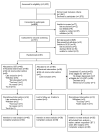Early cognitive behavioral therapy for depression after cardiac surgery
- PMID: 22635060
- PMCID: PMC3434264
- DOI: 10.1097/JCN.0b013e31824d967d
Early cognitive behavioral therapy for depression after cardiac surgery
Abstract
Background: Despite high rates of postcardiac surgery depression, studies of depression treatment in this population have been limited.
Objective: The aim of this study was to evaluate early cognitive behavioral therapy (CBT) in a home environment in patients recovering from cardiac surgery.
Methods: : From July 2006 through October 2009, we conducted a randomized controlled trial and enrolled 808 patients who were screened for depressive symptoms using the Beck Depression Inventory (BDI) in the hospital and 1 month later. Patients were interviewed using the Structured Clinical Interview for DSM-IV; those who met criteria for clinical depression (n = 81) were randomized to CBT (n = 45) or usual care (UC; n = 36). After completion of the UC period, 25 individuals were offered later CBT (UC + CBT).
Results: Main outcomes (depressive symptoms [BDI] and clinical depression [Structured Clinical Interview for DSM-IV]) were evaluated after 8 weeks using intention-to-treat principles and linear mixed models. Compared with the UC group, in the CBT group, there was greater decline in BDI scores (β = 1.41; 95% confidence interval [CI], 0.81-2.02; P = < .001) and greater remission of clinical depression (29 [64%] vs 9 [25%]; number need to treat, 2.5; 95% CI, 1.7-4.9; P < .001). Compared with the early CBT group (median time from surgery to CBT, 45.5 days) the later UC + CBT group (median time from surgery to CBT, 122 days) also experienced a reduction in BDI scores, but the group × time effect was smaller (β = 0.79; 95% CI, 0.10-1.47; P = .03) and remission rates between the 2 groups did not differ.
Conclusions: Early home CBT is effective in depressed postcardiac surgery patients. Early treatment is associated with greater symptom reduction than similar therapy given later after surgery.
Conflict of interest statement
Conflicts of Interest and Financial Disclosures: None
Figures
References
-
- Stroobant N, Vingerhoets G. Depression, anxiety, and neuropsychological performance in coronary artery bypass graft patients: a follow-up study. Psychosomatics. 2008;49(4):326–331. - PubMed
-
- Baker RA, Andrew MJ, Schrader G, Knight JL. Preoperative depression and mortality in coronary artery bypass surgery: preliminary findings. ANZ J Surg. 2001;71(3):139–142. - PubMed
-
- Borowicz L, Jr, Royall R, Grega M, Selnes O, Lyketsos C, McKhann G. Depression and cardiac morbidity 5 years after coronary artery bypass surgery. Psychosomatics. 2002;43(6):464–471. - PubMed
-
- Blumenthal JA, Lett HS, Babyak MA, et al. Depression as a risk factor for mortality after coronary artery bypass surgery. Lancet. 2003;362(9384):604–609. - PubMed
-
- Burg MM, Benedetto MC, Rosenberg R, Soufer R. Presurgical depression predicts medical morbidity 6 months after coronary artery bypass graft surgery. Psychosom Med. 2003;65(1):111–118. - PubMed
Publication types
MeSH terms
Grants and funding
LinkOut - more resources
Full Text Sources
Other Literature Sources
Medical
Miscellaneous



